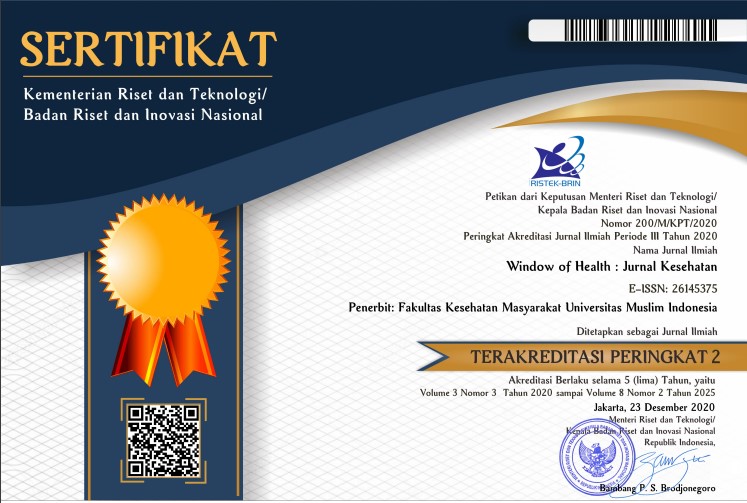Effectiveness of Video as a Health Education Media for Adolescents' Attitudes Regarding Sexually Transmitted Infections (STIs) in Adolescents
Abstract
The increase in cases of sexually transmitted infections (STIs) has increased by more than one million cases worldwide every day. One of the vulnerable groups is that adolescents are the age group that is most at high risk of contracting sexually transmitted infections (STIs) because they are in a transition period characterized by high curiosity. So, at this age, it is always challenging to try new things without being accompanied by a good understanding and attitude about the actions taken. Therefore, health education from an early age is necessary in equipping adolescents with knowledge that impacts changing attitudes regarding Sexually Transmitted Infections (STIs). This study aims to analyze the influence of video media on adolescent attitudes about STIs at SMA Negeri 2 Takalar. This quantitative research method uses the quasi-experimental approach with a one-group pre-post test design. The population in this study was the student council of SMA Negeri 2 Takalar, which amounted to 22 students. The sampling technique in this study used a saturated sample; namely, the entire population became a sample in the study. Data collection techniques used were questionnaires distributed to respondents before and after treatment using video media. The data obtained were then analyzed using a paired sample t-test. The results showed that the value of the difference in the average value before and after health education using video was 9. 14 with a p-value = 0. 000 with a significance level of 0. 05. So it can be concluded that there is a significant influence of the use of video media on the attitudes of students with sexually transmitted infections. Therefore, the use of video media in conducting health education for students is highly recommended to create changes in adolescent attitudes regarding Sexually Transmitted Infections (STIs).
References
2. (WHO) WHO. Sexually Transmitted Infection 2016-2021. World Helath Organization. jenewa; 2016.
3. Dinas Kesehatan Provinsi Sulawesi Selatan. Profil Kesehatan Provinsi Sulawesi Selatan. 2021st ed. Makassar: Dinas Kesehatan Provinsi Sulawesi Selatan; 2021. 333 p.
4. Asrina A, Ikhtiar M, Idris FP. Intervensi Media Promosi Kesehatan Terhadap Perubahan Sikap Anggota OSIS Mengenai Pencegahan HIV/AIDS. J Keperawatan. 2022;14(3):703–8.
5. Notoatmodjo S. Promosi Kesehatan dan Perilaku Kesehatan. Jakarta: Rineka cipta; 2012.
6. Rahmawati N, Hapsari ED, Lismidiati W, Pangastuti N. Pengetahuan Remaja Laki-Laki dan Kebutuhan Pendidikan Kesehatan Tentang Infeksi Menular Seksual (IMS). BKM J Community Med Public Heal. 2018;34(9):357–63.
7. Hatusupy CY. Pengaruh Informasi Melalui Leaflet Terhadap Pengetahuan Dan Sikap Siswa Tentang Kesehatan Reproduksi Remaja Di SMK Negeri 8 Dan SMK PGRI Kota Ambon tahun 2017. Hasanuddin; 2017.
8. Andi Asrina, Sudirman R. Efektivitas Penggunaan Media Video Learning Multimedia (VLM) Terhadap Pengetahuan Infeksi Menular Seksual (IMS) (Studi Pada Waria Di Kota Makassar). J Kesehat. 2020;13(2):91–6.
9. Sefti R, Karundeng M, Mamonto SF. Pengaruh Pendidikan Kesehatan Terhadap Tingkat Pengetahuan Dan Sikap Remaja Tentang Penyakit Menular Seksual Di Smk Fajar Bolaang Mongondow Timur. J Keperawatan. 2014;2(2):1–9.
10. Muliyani S, Afandi AA, Bumi PC. Pengaruh Health Education Tentang Hiv/Aids Terhadap Pengetahuan Dan Sikap Remaja Di Sma Negeri 1 Dander Kabupaten Bojonegoro Tahun 2020. Asuhan Kesehat. 2020;12(1):7–14.
11. Saifuddin Azwar M. Sikap Manusia Teori dan Pengukurannya. Yogyakarta: Pustaka Pelajar; 2016.
12. Wawan A, Dewi M. Teori dan pengukuran pengetahuan, sikap dan perilaku manusia. Vol. 12, Nuha Medika. Yogyakarta: Nuha Medika; 2010.
13. Asrina A, Gobel FA. Pendidikan Kesehatan Reproduksi Melalui Video Learning Multimedia Di Sekolah Islam Terpadu Al Fikri Makassar. In: Hasmin, Diana F, Ibrahim, editors. Scientia Prosiding Abdimas dan Penelitian [Internet]. Makassar: Adpertisi; 2019. p. 1–7. Available from: https://jurnal.adpertisi.or.id/index.php/SCIENTIA/article/view/42%0Ahttps://jurnal.adpertisi.or.id/index.php/SCIENTIA/article/download/42/27
14. Nanlohy W, Asrina A, Kurnaisih E. Pengaruh Media Edukasi Video Dan Leaflet Terhadap Pengetahuan Dan Sikap Remaja Mengenai Pernikahan Dini Di Dobo Kepulauan Aru. In: Prosiding Seminar Nasional … [Internet]. Makassar: Yayasan Pendidikan dan Research Indonesia (YAPRI); 2021. p. 316–46. Available from: https://jurnal.yapri.ac.id/index.php/semnassmipt/article/view/259%0Ahttps://jurnal.yapri.ac.id/index.php/semnassmipt/article/download/259/210
15. Feratama R, Nugraheny E. Pemanfaatan Penyuluhan Dengan Media Audiovisual, Dapatkah Meningkatkan Pengetahuan Remaja Tentang Infeksi Menular Seksual? J Ilmu Kebidanan. 2021;7(2):19–24.








